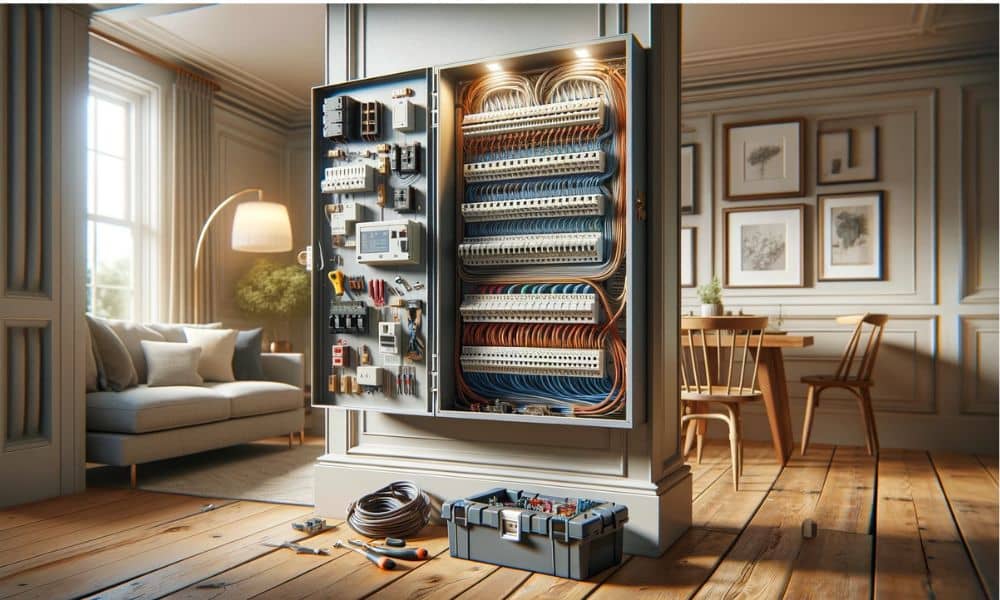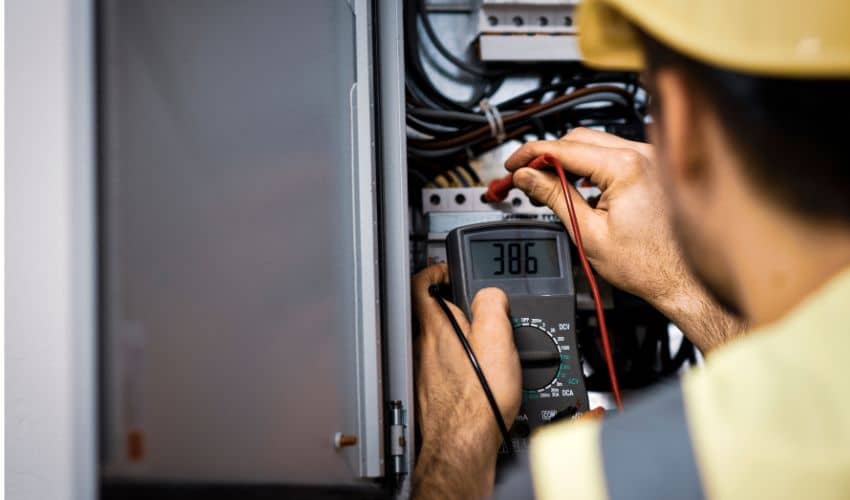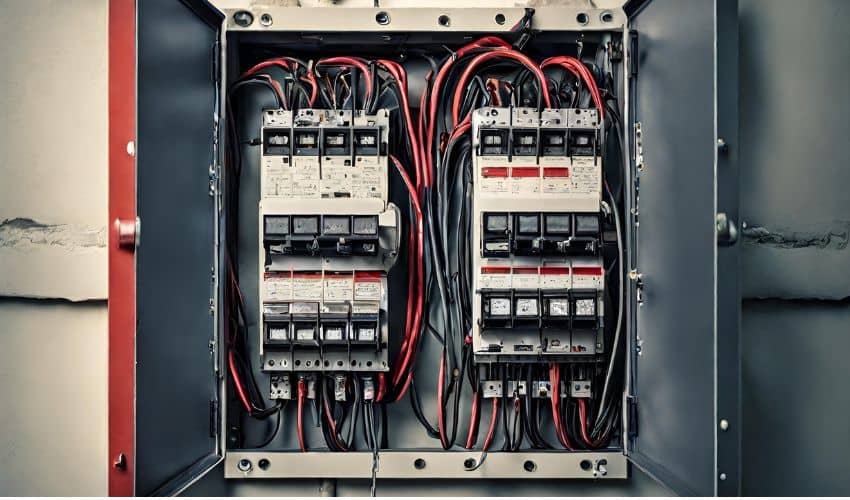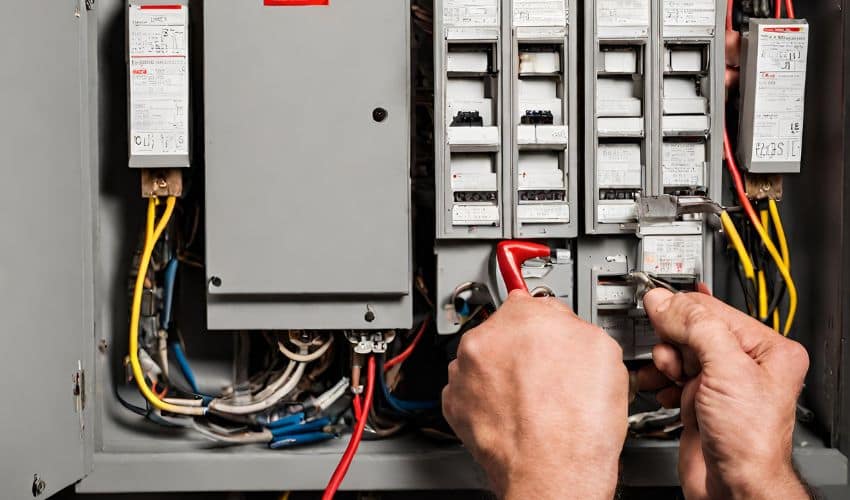Can a homeowner replace an electrical panel?
Written by Total Power Energy Team
Published:
When it comes to home maintenance, the electrical panel is one of the most important components of your home’s infrastructure. It’s like the heart of your home’s electrical system, pumping energy to appliances, lights, and outlets.
So, when issues arise, you might wonder: Can a homeowner replace their own electrical panel? It’s a big question, and the answer is not a simple yes or no. It involves understanding regulations, safety issues, costs, and when to call a professional.
Can a Homeowner Replace Their Own Electrical Panel?
In theory, a homeowner replaces their own electrical panel. but it’s strongly not recommended if you don’t have experience with electrical work. Handling an electric panel involves high-voltage wiring that can lead to serious injury or death if not handled properly.
Furthermore, incorrect installation could result in an electrical fire. Therefore, while replacing the electrical panel yourself might seem cost-effective, the risks and potential future costs far outweigh the initial savings. A licensed electrician should be the one to perform such critical and hazardous work.
Do Homeowners Need a Permit to Replace an Electrical Panel?
Many tasks require a permit from your local building department regarding electrical work. Safeguard ensures the work is done to a standard that minimizes risks such as electrical fires or other hazards.
Understanding Permits for Electrical Panel Replacement
Before considering replacing your breaker panel, you must understand the permit requirements in your area.
Permits are a formal way of ensuring that any major work, including breaker box replacement, adheres to the building code and safety regulations.
Skipping this step can have serious implications, including voiding your home insurance.
When Is a Permit Needed to Replace an Electrical Panel?
Generally, any significant electrical work, including an electrical panel upgrade, requires a permit.
This isn’t just bureaucracy—it’s a matter of ensuring that professionals inspect the electrical service panel work and is up to code, which is crucial for the safety of your household.
How to Obtain a Permit for Replacing an Electrical Panel
To secure a permit, you’ll typically need to provide a detailed work plan to your local building department.
It might also necessitate a visit from an inspector to sign off on the work once completed. The process varies by location, so check with your local authorities.
Importance of Hiring a Licensed Electrician for Panel Replacement
A licensed electrical contractor is equipped with the knowledge of electrical codes, the size of the panel needed, and how to handle the electrical current safely.
They will also navigate the permit process on your behalf, ensuring that all electrical panel needs are met legally and safely.
When You Should Replace Your Electrical Panel
There are several signs that you need to upgrade your electrical panel. If you experience frequent breaker trips or use multiple power strips because you don’t have enough outlets, it’s time to replace the panel.
If your current panel is a fuse box or if it’s over 25 years old, these are clear indicators that an upgrade is in order.
How Much Does It Cost to Replace an Electrical Panel?
The cost to replace an electric panel can vary widely. Electrical panel upgrade costs can range from $1,200 to $2,000 on average. Factors that affect the price include the panel size, the type of panel installed, and whether additional electrical wiring is needed.
Signs That You Need to Change an Electrical Panel
An electrical panel that needs an upgrade may show several signs.
Frequent Breaker Trips: If your circuit breakers frequently trip, it indicates that your Fuse box is struggling to handle the current demand.
Scorched or Melted Wires: The presence of scorch marks or melted wires on your electrical panel is a serious red flag.
Visible Rust or Corrosion: Rust or corrosion on your circuit breaker panel suggests the panel’s integrity may be compromised.
Flickering Lights: Flickering lights, especially when appliances are turned on, indicate that your electrical panel cannot provide a stable power supply.
Warmth or Buzzing: If your electrical panel feels warm to the touch or emits a buzzing sound, it’s a cause for concern.
Outdated Panel: If your electrical panel is over 20 years old, it may need to meet current safety standards.
Unexplained Burning Smell: A burning smell from your circuit breaker panel is a warning sign that something is wrong.
If you experience any of these signs, your electrical panel may need replacement.
DIY vs. Professional Replacement
While some homeowners are skilled in electrical projects, replacing an electrical panel involves significant electrical components and a thorough understanding of electrical safety.
A licensed electrical contractor has the expertise and will ensure that your home remains insurable and that the work is up to code. Here are the pros and cons
DIY Electrical Panel Replacement
Pros-
- Cost Savings: The most significant advantage of DIY panel replacement is the potential for cost savings. You won’t have to pay for labor, which can be a substantial portion of the project’s total cost.
- Learning Experience: For those strongly interested in home improvement and electrical work, doing it yourself can be a valuable learning experience.
- Control Over Timeline: When you do it yourself, you have control over the project’s timeline. You can work on it on your schedule without waiting for an electrician to become available.
Cons-
- Safety Risks: Electrical repair poses serious safety risks, including electrocution and fire hazards. Without proper training, you are at increased risk of accidents.
- Quality Concerns: Professional electricians have the experience and knowledge to do the job correctly. A DIY approach may lead to mistakes and future issues, potentially causing more expenses in the long run.
- Permit and Inspection Issues: Most jurisdictions require a permit for electrical work. DIY work might fail to pass inspection, leading to legal issues and additional costs to correct the work.
- Insurance Implications: If an electrical fire or other problem occurs due to improper installation, your home insurance might not cover the damages if a licensed professional doesn’t perform the work.
- Resale Problems: You must disclose any DIY electrical work when selling your home. This can be a red flag for buyers and may affect the home’s value.
Professional Electrical Panel Replacement
Pros-
- Safety: professional electricians are trained to handle the complexities of electrical work safely, significantly reducing the risk of accidents.
- Expertise and Efficiency: Professionals bring years of experience, which means the job will likely be done quickly and correctly the first time, avoiding future issues.
- Permits and Code Compliance: Electricians are familiar with the local building codes and can obtain the necessary permits, ensuring that the work is up to standard and will pass inspections.
- Insurance Assurance: Work performed by an Electrical technician is typically covered by your home insurance policy, providing peace of mind.
- Warranty and Guarantee: Many professionals offer warranties on their work, so if something goes wrong, they’ll fix it at no additional cost.
Cons-
- Cost: Hiring a professional is more expensive upfront due to labor costs.
- Availability: You may need to schedule the work according to the electrician’s availability, which can be inconvenient.
- Finding the Right Professional: It can be challenging to find a reliable and licensed electrician, requiring time and effort to vet potential candidates.
Benefits of Replacing an Electrical Panel
Updating your electrical panel can improve home safety, make your home’s electrical system more efficient, and provide the necessary power for all your electrical needs.
With a new breaker box, you can avoid electrical fires and shock and provide a more stable power supply for your home’s electrical appliances.
When Do I Call A Professional Electrician?
It’s best to call a professional whenever you need clarification on the condition of your home’s electrical panel or if you observe any worrying signs.
Also, suppose you’re adding more appliances or need more power for a home renovation. In that case, a professional can assess if it’s time for a new panel.
Bottom line
In the end, while it might seem cost-effective to attempt to replace electrical panel components yourself, the risks and potential long-term costs outweigh the immediate savings.
Hiring a licensed electrician ensures the job is done safely, efficiently, and up to the legal standards.
Please don’t take risks when it comes to your home’s electrical service. Total Power Energy is here for all your electrical panel services. We ensure your home is safe and efficient.
Frequently Asked Questions
Can I Replace a Panel Myself?
While you technically can, hiring a licensed professional to ensure safety and compliance with electrical codes is highly recommended.
Can I Replace a Breaker Without an Electrician?
Simple replacing a circuit breaker with a knowledgeable homeowner can do. But it’s always safer to have electrical experts handle any electrical task.
Is it Safe to Replace a Breaker Yourself?
If you have experience and understand electrical safety, you can. However, it’s safer for most people to have a professional do it.
Can a Homeowner Do Their Own Electrical Work?
Minor tasks like changing an electrical outlet may be manageable. Still, significant projects like panel upgrades should be left to professionals to ensure electrical safety.





